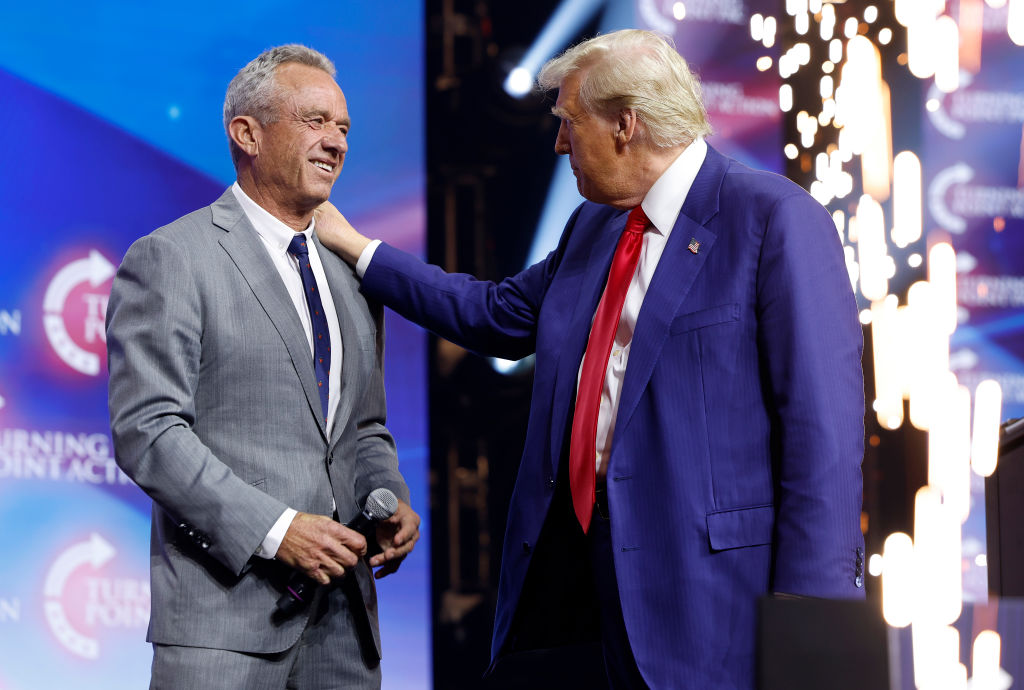Last night, Donald Trump signalled a seismic shift in American science and public health. Fulfilling his campaign promise, he endorsed Robert F. Kennedy Jr as secretary of the US Department of Health and Human Services (HHS), the largest federal department with a $1.7 trillion annual budget and over 80,000 employees. Kennedy’s statement in response vows to “bring together the greatest minds in science, medicine, industry, and government to put an end to the chronic disease epidemic”, as well as to “clean up corruption” and return the health agencies to “gold-standard, evidence-based science”.
Left-leaning outlets, such as the Atlantic, Washington Post, PolitiFact, and Forbes — as well as the predominantly Left-leaning medical establishment — were quick to lambast the choice, using selective quotations and a narrow focus to smear Kennedy. But establishment mandarins who focus on his sometimes eccentric scientific claims, from vaccines to AIDS, overlook the single most important factor in his success: the anti-science, authoritarian policies of the Covid years. As a result, they miss what matters most in the Kennedy phenomenon: his broadly appealing, and thoroughly centrist, reform agenda.
This knee-jerk reaction hides the dilemma that members of the medical establishment face: do they position themselves as defenders of an increasingly untenable status quo, or do they embrace the opportunities of RFK Jr.’s reform agenda, much of which aligns with values and concerns that they have been raising for years?
Medical officials failed badly in the Covid era by supporting lockdowns, school closures, toddler masking, and mandates. Their championing of anti-science policies has caused massive health and social harm, which reverberates today. The 2024 US election was a vote against the establishment and in favour of fundamental reforms; it is unsurprising that the same establishment which endorsed lockdowns and mandates now fights kicking and screaming against oncoming change.
The rot, having accumulated over decades, was plain for all to see. The National Institutes of Health (NIH), whose annual budget is $45 billion, orchestrated under the leadership of Francis Collins and Anthony Fauci a massive suppression of scientific debate and research. The Centers for Disease Control and Prevention (CDC) exaggerated risk and issued policy guidance with little evidence in support of unprecedented vaccine mandates. The Food and Drug Administration (FDA)’s conflicts of interest with the pharmaceutical industry meant vaccines and therapeutics were approved with little to no evidence, sometimes based on faulty modelling. And the Biden administration pushed all of this with orchestrated PR campaigns, spreading falsehoods and misinformation.
Clearly, the status quo is no longer tenable. Trust in American physicians and hospitals dropped from 71% to 40% between 2020 and 2024, according to a July study in JAMA. A Covid-era political realignment facilitated Trump’s electoral win last week, with a coalition that included disenchanted Left-liberals who rejected the centralised power of scientific bureaucrats and found an ally in Kennedy. Yet the officials continue to deny their own culpability, avoiding a long look in the mirror.
Kennedy can be that mirror. A successful environmental lawyer and erstwhile darling of the centre-left — so much so that Barack Obama floated him to lead the Environmental Protection Agency in 2008 — he is the most high-profile figure to tackle these problems head-on. His rebranding of MAGA to Make America Healthy Again (MAHA) can carry broad appeal for Americans.
His agenda will focus on decentralising power in America’s recalcitrant scientific and medical institutions, offering an opportunity to allow true scientific research and evidence-based policy to flourish. With his focus on chronic disease and children, research priorities will realign with public health ones. Kennedy also plans to confront the veil of secrecy and dishonesty that inhibits transparency and integrity in public health and medicine. He intends to strengthen checks and balances in Government health bureaucracies to confront groupthink and undue corporate influence. More than that, he is seeking to ensure open public debate in medicine, recognising that science is incompatible with censorship.
The central argument against Kennedy from the medical establishment pertains to some of his scientific claims, for example about vaccines, wireless radiation and cancer, raw milk, and neurodevelopmental disorders caused by water fluoridation. Kennedy is not a scientist, but his good-faith calls for better research and more debate are echoed by many Americans. If he remains true to this promise, scientists will be able to work to address the challenges of evidence in ways that previous administrations have not. The status quo is not working for the public interest or patients. If the medical establishment becomes obsessed with resistance, it will marginalise itself and lose what little trust the public currently places in it.
The American public voted for disruptors like RFK Jr in 2024, and academic medicine now has an opportunity to atone for its Covid-era blunders. If it engages constructively, it can participate in crafting and implementing reforms that would, indeed, make America healthy again.











Join the discussion
Join like minded readers that support our journalism by becoming a paid subscriber
To join the discussion in the comments, become a paid subscriber.
Join like minded readers that support our journalism, read unlimited articles and enjoy other subscriber-only benefits.
Subscribe